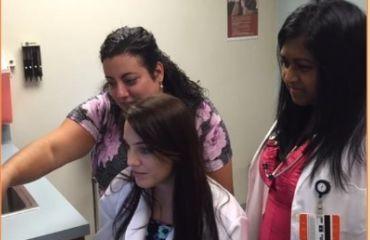
Section Branding
Header Content
Three-Year Family Med School Aims To Address Primary Care Shortage
Primary Content

One of the goals of health reform is to cut costs by keeping patients healthy through preventative care. But that approach leans heavily on routine care from family doctors - who are in short supply. A program in Savannah, Georgia is trying to fast-track primary care doctors through medical school.
Inside Memorial Hospital’s pediatric unit, Mary Keith makes her rounds, checking on a seven-week-old patient who’s about to go home. Keith is a family medicine resident at Mercer University. But unlike most students, she spent just three years - not four - in medical school before starting her residency.
Keith says the shortened program was appealing, but that’s not the only reason she chose Mercer.
“When I came into medical school I knew I wanted to do family medicine, so it kind of seemed like a no-brainer to me to have a fast-track into a good family medicine program,” she says.
The accelerated program cuts out some electives, like clinical experience in ear, nose, and throat (ENT) or pulmonology. Still, students like Keith will save more than $40,000 in tuition and start earning a salary a year early.
Dr. Robert Pallay is chairman of the Department of Family Medicine at Mercer. He says if you can cut the length and cost of med school, more students will consider primary care over a higher-paying specialty.
“One of the things that helps the students choose what discipline they want to go into in medicine is funding,” he says. “You talk to medical students, a lot of them don’t want to admit that money is the reason behind their choice of a specialty, but we all know that that’s real.”
Especially, he says, when they know they’ll be graduating with hefty student loans.
Texas Tech University has a similar fast track program and several schools around the country are looking at this model.
Dr. Rich Hawkins of the American Medical Association says this approach could help solve the primary care doctor shortage.
“But a caution is just making sure that when students graduate early from medical school, that they’re ready to graduate,” Hawkins says.
And if they’re not, he says, med schools have to make sure students get the skills they need before they’re allowed to practice.
The three-year model could catch on: the AMA is looking at ways to improve medical education in general, including accelerated training for some students. The state of Georgia recently approved more than a million dollars a year to expand Mercer’s program.
Tags: medical school, health reform, Memorial Hospital, Mercer Univeristy, GPB Savannah, GPB News, medical education, primary care, family medicine, primary care shortage, accelerated medical school, medical training, Sarah McCammon
